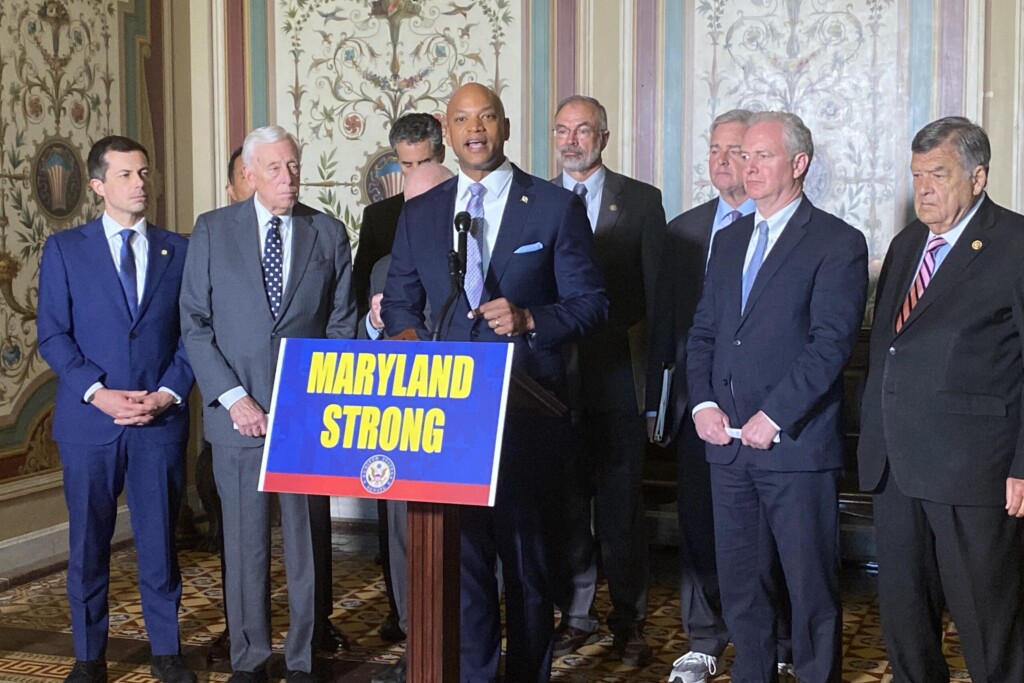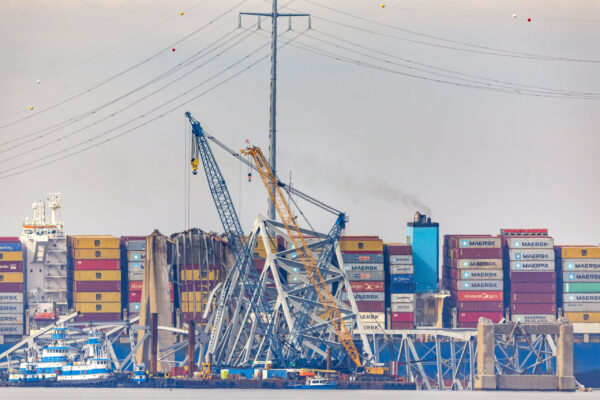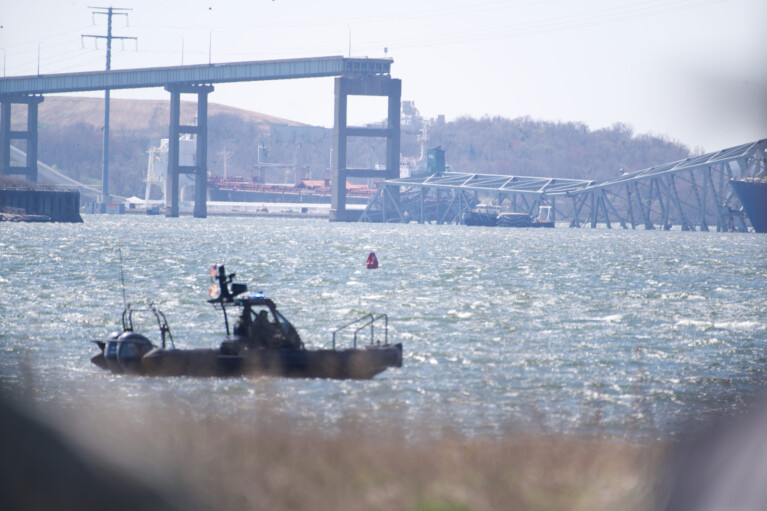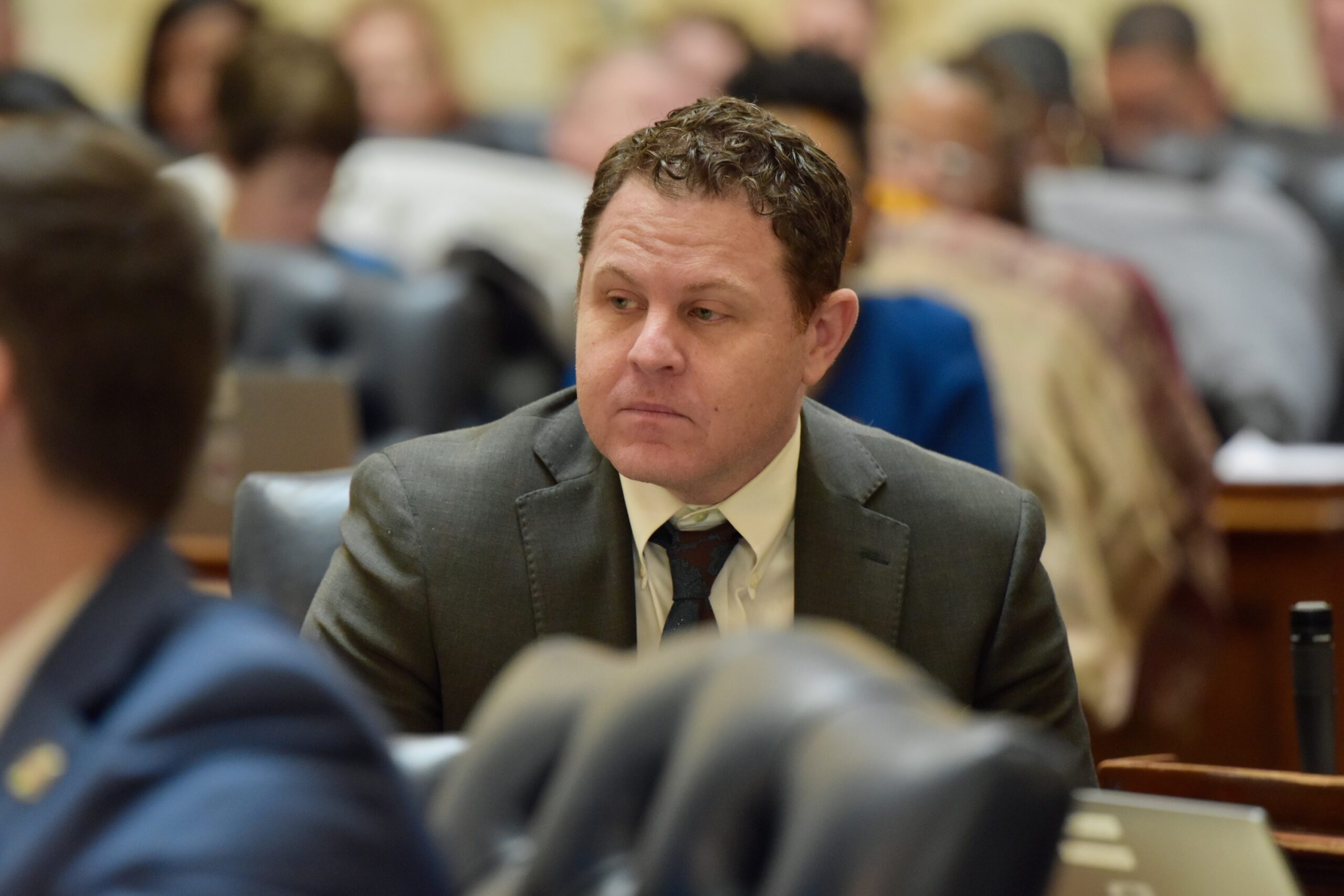Maryland congressional delegation to launch bipartisan push for funds to rebuild bridge

Maryland’s congressional delegation plans to introduce legislation in the coming days that would require the federal government to cover the costs of rebuilding Baltimore’s Francis Scott Key Bridge, though lawmakers didn’t have a price tag to cite during a Tuesday press conference — or a firm commitment from GOP leaders in the U.S. House to move the bill through that chamber.
Democratic Sen. Ben Cardin said the bill is needed to avoid Maryland incurring 10% of the costs, based on the federal law that has sometimes determined the split between what the federal government pays and what expenses are incurred by state governments in this type of event.
“This is not unprecedented — the 100% was used in regards to the Minnesota bridge replacement. And this is a commitment that is normal for this type of a catastrophic loss of major infrastructure,” Cardin said, referring to the collapse of the Minneapolis Interstate 35W Bridge in August 2007.
The legislation, he said, would also make it clear that any “third party recoveries, from liable entities or insurance, will go to relieve the federal taxpayers of the burdens that have been sustained as a result of the loss of the bridge.”
Cardin said in response to questions about Republican support for the bill that he was “encouraged” by conversations he’s been having.
“I am optimistic we will get traditional bipartisan support for this legislation,” Cardin said.
‘Tragedy knows no partisanship’
Maryland Rep. Andy Harris, the sole Republican in the state’s congressional delegation, said the first step of the process is determining the cost-share and that there would be time for debate about the additional steps later.
“Tragedy knows no partisanship — this wasn’t a Republican tragedy, it wasn’t a Democratic tragedy and the solution won’t be a partisan solution, it will be a bipartisan solution,” Harris said.
Legislation will be necessary, Harris said, “to make sure that Maryland doesn’t have to bear a cost-share, to make sure that this bridge is built back better than the bridge that was there already.”
“I’m committed to make sure that we navigate this through a bipartisan process, both houses and get it to the president’s desk, so we can bring relief to the city of Baltimore, the state of Maryland,” Harris said.
Responding to reporters’ questions after the press conference, Harris said additional information needs to be available before lawmakers can begin negotiations on additional steps beyond the cost-share.
“We don’t even know what the design of the bridge is going to be, what the cost is going to be,” Harris said. “There’s a lot of time to talk about the rest.”
Freedom Caucus demands
The far-right House Freedom Caucus announced last week that Congress should fully offset or pay for the funding and that it should waive regulations like the Endangered Species Act and labor agreements.
Harris is likely a member of the group, though it doesn’t publish its membership list.
Maryland Democratic Rep. Steny Hoyer noted during the press conference the state has four members on the House Appropriations Committee, including himself, Harris, Rep. Dutch Ruppersberger and Rep. David Trone.
Maryland Sen. Chris Van Hollen is on the Senate Appropriations Committee, providing the state even more influence on the spending panels.
“We will be working tirelessly until we get the sums that are necessary to heal this wound,” Hoyer said.
Buttigieg says no waiting on insurance payouts
Transportation Secretary Pete Buttigieg said during the press conference that while “there may be private parties held liable” for the collapse of the Francis Scott Key bridge, the federal government doesn’t want to wait for that to happen before rebuilding the bridge.

Debris is cleared from the collapsed Francis Scott Key Bridge Sunday as efforts begin to reopen the Port of Baltimore. (Photo by Tasos Katopodis/Getty Images.)
“It is our expectation that the federal taxpayer will be made whole, but we do not want that to get in the way,” Buttigieg said. “That is why whatever insurance, litigation and other related processes play out, we are not going to wait for them to play out to make sure these dollars are getting to where they need to be.”
Maryland Rep. Kweisi Mfume, who represents the congressional district that includes the site of the bridge collapse, said the last couple of weeks have proven the state of Maryland and the country “can still overcome disasters and tragedies by working together.”
Mfume said lawmakers have not lost focus on the six construction workers who died when the ship struck the bridge, or the workers at the port who have had their jobs upended by the tragedy.
“Every now and then when we have been doing these, we stop to make mention of those six men on that bridge — stories that really have not yet been told,” Mfume said. “Men who have been in this country 16, 17 years; working two jobs; who are married, raising children; giving of their heart and soul and sweat; and who on that fateful night met their end.”
More than 3,000 longshoremen have also had their jobs and financial stability upended by the ship striking the bridge, leading it to collapse, Mfume said.
Army Corps recovery work
U.S. Army Corps of Engineers Lieutenant General Scott A. Spellmon spoke at the press conference about the recovery efforts, following a closed-door briefing with the governor and the state’s congressional delegation.
“The federal navigation channel into the port of Baltimore is 700 feet wide by 50 feet deep, and today it has 9,000 tons of steel at the bottom and 3,000 tons of concrete,” Spellmon said.
The steel truss hanging off of the ship that crashed into the bridge weighs an additional 5,000 tons, he said.
“We’re committed to getting this concrete and steel out of the channel by the end of May and that work has already commenced,” Spellmon said. “We’ve had 51 divers in the water over the past 14 days and we’ve also found an opportunity to do some concurrent work where we can restore some access to the port.”
That “limited access channel,” Spellmon said, will be 280 feet wide by 35 feet deep and will allow about 80% of the cargo to travel into the port and roughly 74% to leave the port of Baltimore. That will be fully cleared and available by the end of this month.
Recovery efforts for the men who have not yet been found will also continue, he said.




 Creative Commons Attribution
Creative Commons Attribution